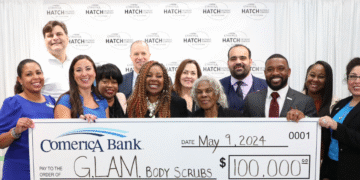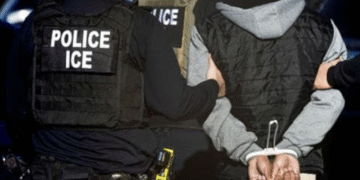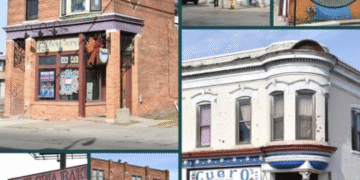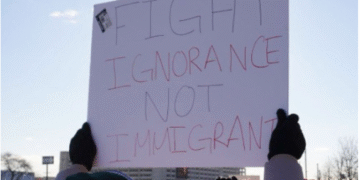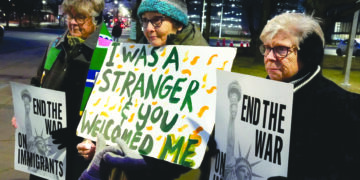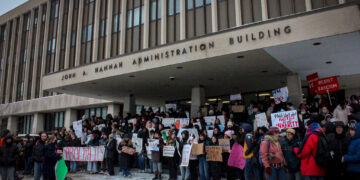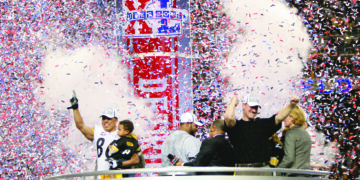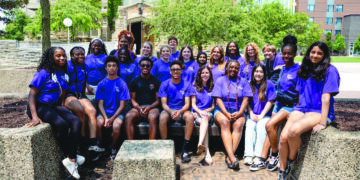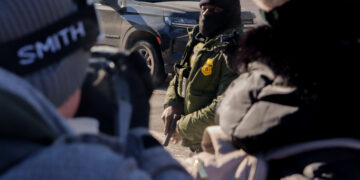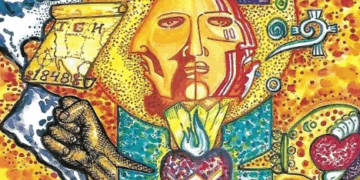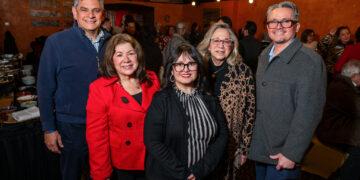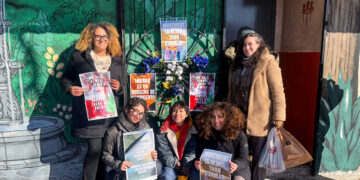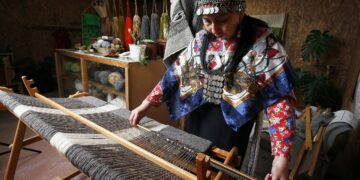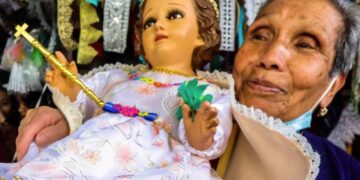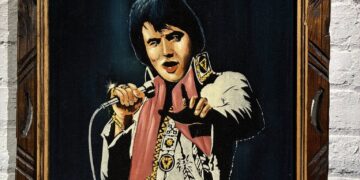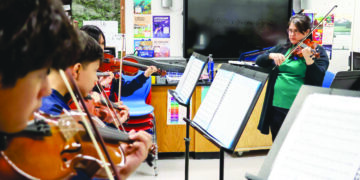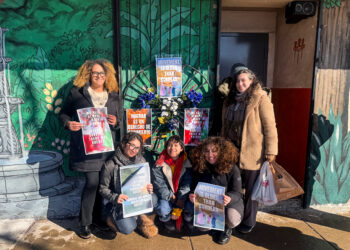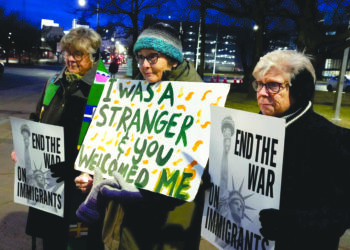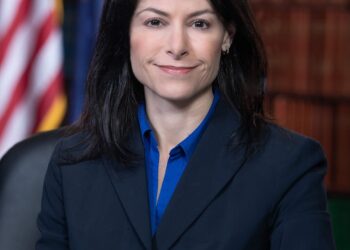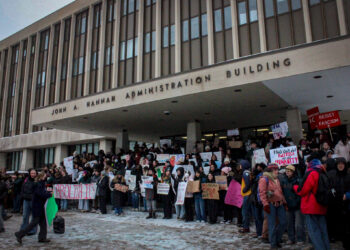On February 17, families living near Beard and Rowan streets were abruptly awoken by water rushing through their neighborhood. A 54-inch water main busted, submerging cars, filling basements, and, in some cases, reaching the main level of homes, all while it was below freezing outside. It was an unexpected disaster, and according to a statement by Sue Coffey, CEO of Great Lakes Water Authority, the burst pipe was likely not preventable.
A little over a month later, local nonprofit organizations recall the devastating day and the subsequent actions made to keep the affected residents safe throughout the tough experience.
“We had several staff along with, you know, some of our other partners who went out with some of the city officials to start knocking on the doors, making sure people were safe,” Angie Reyes, executive director and founder of Detroit Hispanic Development Corporation (DHDC) said.
Reyes, along with others, quickly recognized the great need for bilingual speakers and nonauthoritative personnel because of residents’ fear of deportation.
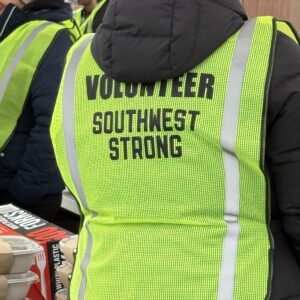
An initiative, known as ‘Know Your Rights,’ began in Southwest Detroit after the Trump Administration’s plan to fulfill the largest deportation in U.S. history. Southwest Detroit residents were fearful especially after claims of increased patrolling in neighborhoods a week into Trump’s taking office.
“We had just had multiple meetings about not opening your door, you know with deportation, and Know Your Rights,” said Maria Salinas, executive director of Congress of Communities (CoC).
Communication between city officials, police officers, and the affected residents was the first major challenge because of language barriers and mixed legal statuses, exemplifying the need for local organizations and volunteers to step in.
“I was out the door by 8:30; they had me in rubber boots, a rubber yellow outfit, in a squad car with Officer Love. I’ll never forget it. I mean, it was like a movie,” said Salinas, as she remembered getting the call to come to ground zero immediately to knock on doors.
Salinas said that as she was going door to door, some families knew her and that they could trust her. For the families that were not as familiar, she provided a card and informed them who she was and that they were in no harm. She was simply there to help them.
“I think our role as Congress of Communities was you know the familiarity of our agency,” said Salinas. “We do a lot of underground grassroot everything. You know people know us.”
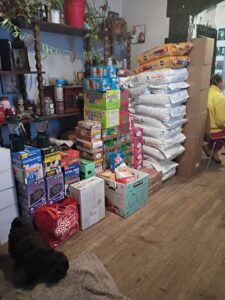
Urban Neighborhood Initiatives (UNI) and DHDC were more familiar faces that the community could trust to knock on their door and get them to a safe place as soon as possible. UNI immediately took it upon themselves to begin using an intake form as they knocked on doors to gather vital information on the residents. This form was shared with peer organizations to start providing case management and understanding the immediate needs.
“When people left, they took nothing. Just the clothes on their back, maybe a backpack.” Mary Carmen Munoz, executive director of Latin Americans for Social and Economic Development (LA SED) said. Therefore, people needed all necessities such as clothes, toiletries, cleaning supplies, diapers, formula, and medical necessities. Because of this, each organization set up its respective donation centers.
The City of Detroit set up their donation center at Patton Park. The recreation center at Patton Park, however, was far from ground zero, and organization leaders soon found out that Patton Park was not set up to monitor who received donations.
Led by then CEO Laura Chavez, the staff at the Southwest Detroit Business Association (SDBA), used their connections with major businesses to get donations to all the hubs across Southwest Detroit and directly into the hands of affected residents.
Major businesses and organizations that answered the call included the American Red Cross, Gleaners, Forgotten Harvest, Alliance Catholic Credit Union, Meijer, and Walmart to provide medical necessities, food, and clothing. SDBA was also the go-to for local businesses and organizations to provide goods and services such as E&L Supermercado, Prince Valley, Santos Church, El Barzon, La Palapa del Parian, and many more.
Munoz from LA SED agreed to offer its Senior and Youth Center as a drop-off location since it was only a few blocks away from ground zero creating one of the major donation hubs at W. Vernor and Green St.
DHDC utilized the Delray Community Center for case management and as a central donation depot. UNI accepted donations and managed the distribution to affected residents from the basement of their All Saints Neighborhood Center.
“Something that brought me great comfort was when I would walk downstairs, how many people I recognized from the neighborhood; it was really beautiful,” Christine Bell, executive director of UNI said.
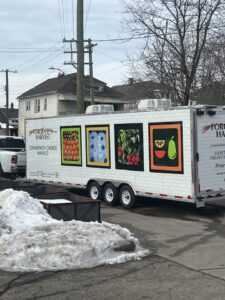
Salinas from CoC recalled running into Sonia Rose while going door to door and devising a plan together to get donations and provide support to the affected residents. The first step was to contact the city to get intel on what hotels people were being taken to so they can bring supplies to them.
The five organizations kept close communication with the city mainly through District 6 Manager Eva Torres and Councilmember Gabriela Santiago-Romero to inform them on issues as they were brought to community leaders’ attention.
CoC and Southwest Pride set up tables and tents to provide donations and resources at Green and Lisbon Streets for the families that never left their homes. There Rose met Jimmy Rios, a licensed plumber who put aside his day to day work to provide his knowledge and skills to as many households as he could.
Rios alerted Salinas on the second day about the utilities being left on in the homes. Together they walked inside of homes with people still there and noticed some houses reeked of gas. The two of them personally walked into 42 homes that day, convincing people to leave.
“He turned off the water, he turned off the gas and he drained the water [so the pipes would not freeze],” Salinas said.
Salinas took a video of Jimmy explaining why the utilities needed to be turned off as soon as possible and posted it on Facebook. That also included a tutorial on how to properly do the process on their own.
“He probably saved people’s lives and probably a couple of houses from not exploding,” Salinas said.
Then leaders realized ‘what to do with pets?’ And because of Detroiters Helping Each Other and the Michigan Humane Society, pets were taken care of.
“The Humane Society jumped in and provided food for pets and cages and blankets for them,” Munoz said, “they provided temporary homes for the pets until the people affected were able to come get them.”
Jessica Ramirez, from Detroiters Helping Each Other, not only helped pets but she set up her own base on Beard St where she accepted donations from individual residents and local businesses.
“When I got over there, I started assessing with my team, went back home, and an hour later, came back for the first four days, posted up on Beard Street, gave out home-cooked meals, cleaning supplies, food, crock pots, diapers, anything you could think of that somebody needed,” Ramirez said.
Another major problem became transportation because when the water main burst Detroit Public Schools were on winter break, so the following Monday (February 24th) kids needed to go back to school. Community leaders did everything they could to find a solution by working with the city and residents to provide free transportation.
The initial water main break caused a series of unforeseen emergencies that the city of Detroit was not prepared for.
“Having the robust ecosystem of nonprofits and resident groups has just been, I think, really critical to ensuring that we could respond quickly and that we could provide some support in a really devastating situation,” Bell said.
Ramirez said her team is still assisting the families left in the hotels and is hoping to have meetings going forward to set a plan for future disasters with the other community leaders. (As of our publication date, there were only two families left in hotels.)
“We’re hoping that the lessons learned from this experience will help us and the city create a better system moving forward. So, if and when something like this occurs again, we’ll be in a better place for the city and for the community to be able to respond more effectively and faster so that there’s less damage and trauma,” Reyes said.
Urban Neighborhood Initiatives continues to accept monetary donations on behalf of the coalition of agencies offering assistance to the affected residents. Call 313-841-4447 for more information on how you can help.
EDITOR’s NOTE: EL CENTRAL Hispanic News has compiled from the agencies profiled in this article a comprehensive list of dozens of volunteers and local businesses who came forward to provide assistance to the residents who were affected by the flooding. The list is posted on our website at www.elcentralmedia.com. If any volunteers or businesses were missed, email us at info@elecntralmedia.com.
Andrea Meza graduated from Wayne State University with a journalism degree and was the first student to major in Latin American Studies at the school. She has strong ties to Southwest Detroit with a passion to connect to the community through her writing. In her free time, she loves to learn about history and be in nature.
EL CENTRAL Hispanic News is partially funded by Press Forward, the national movement to strengthen communities by reinvigorating local news. Learn more at www.pressforward.news.


